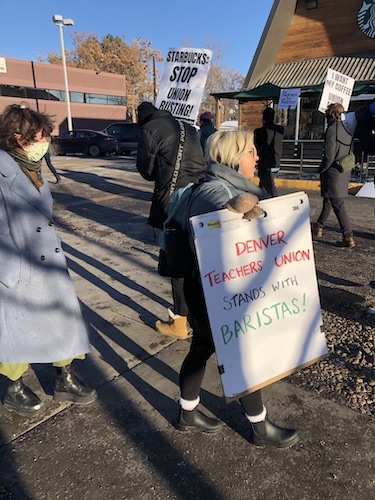Despite the chill, on the morning of March 11, a large crowd gathered at the Starbucks at Milwaukee St. and E. Colfax Ave. in Denver. People cheered as the workers walked out of their shift at 7 a.m. with demands for better working conditions, accountability from management and a recognized union. The walkout was part of a one-day Unfair Labor Practices strike by the workers, who are seeking the union representation of Workers United.
The jovial group, which included teachers from the nearby East High School, began picketing as a supportive truck driver circled the block again and again to lay on their horn in solidarity. Many drivers saw the picket line and honked in support as they drove to get coffee elsewhere.
Numerous local organizations, workers and representatives from other unions joined the picket line. The teachers who joined are represented by Denver Classroom Teachers Association, and other attendees were members of SEIU Local 105, IBEW Locals 111 and 68, CWA Local 7799, Teamsters Local 455 and the Colorado AFL-CIO. Denver DSA and Denver PSL also participated on picket lines, and Liberation News reporters interviewed workers.
When asked how the bosses have responded to the unionizing efforts, Starbucks worker Vanessa Castro-Lopez said, “They have no interest in running a unionized store … that is the quote from them.” Castro-Lopez went on to describe what a union would mean to the workers. “It would mean that we would actually be partners at the table.”
Starbucks refers to their workers as “partners,” saying that “when you work at Starbucks, you are more than an employee — we call each other ‘partners’ — someone who shares in the mutual success and rewards of our enterprise.” Clearly, Starbucks does not consider its workers real partners, as the corporation makes billions of dollars in profits each year while workers struggle with understaffed stores and remain underpaid, often needing to work other jobs to make ends meet.
Lillian Sanders, who has worked at Starbucks for over three years, describes the conditions at the Colfax store since the workers started to talk about unionizing. “We’re constantly having bosses cornering us under the guise of supporting us and we constantly feel like we’re going to get in trouble … People are given write-ups without any prior documentation, or conversations for offenses that aren’t that severe.”
Since the unionizing efforts began, and after the historic win by Starbucks workers in Buffalo, baristas at this location have been subject to repeated “two on one’s” — intimidating meetings where a store manager and a district manager corner and grill an individual barista. According to workers, these meetings are designed to intimidate baristas and try to pit workers against each other. Despite the company’s attempts to isolate and unjustly discipline baristas, the workers realized their collective power and did not cave in to the boss’s intimidation tactics.
Michaela Sellaro, a shift supervisor, was one of the workers cornered by the managers, and she described her experience. She was written up, receiving a “final warning,” despite having been an exemplary employee for years. This retaliation was part of the reason for the workers’ walkout.
“[The two on one] was devastating, honestly. I’ve never been written up in my almost three years with the company. It felt like an extreme and serious escalation based on a small mistake that I was accountable for from the beginning. And rather than be honest with me about where I made a mistake, they waited 25 days to write me up with a ‘final written warning.’ They cornered me in the back room, 40 minutes before the end of my shift, and told me that I had to shamefully highlight schedules. My confidence in my ability to do my job was shattered.”
This unfair and unnecessarily hostile treatment sparked the final decision for the workers’ walkout, but there was an entire chain of events that led them to this point.
Sellaro outlined the degradation of worker morale alongside declining working conditions in recent years: “As a corporation, Starbucks has really moved away from focusing on what’s best for partners and we’ve — as a group — across the company, come to the conclusion that a union is a good idea. And now we’re at the point where we’re asking Starbucks to stop trying to interfere with our attempts to unionize: stop spying, stop manipulating, stop disinforming; come to the table with transparency, accountability and honesty like we are. We’re here doing it, and we’re asking them to do the same.”
Working conditions for service workers during the pandemic have been heinous and cruel, especially without proper protocols in place.
Lillian Sanders described conditions during the COVID-19 pandemic: “We’ve been under facial covering mandates frequently, and we’ve been told to serve customers anyway when they’re not abiding by those mandates, which has been really frustrating. We have a lot of partners who have an immuno-compromised family member, if not themselves, so it’s been a concern we’ve brought up to management, and we’ve been told to basically serve these people anyway.”

Unions are at an “uncharacteristic forefront” in Colorado right now following a successful grocery store workers strike in Denver. Across the nation there have been incredible victories and formidable struggles waged by ski patrol workers, nurses and pastry workers, to name a few. It seems safe to say that this struggle won’t remain “uncharacteristic” for much longer as workers boldly hold to their demands for better wages and quality of life across a number of industries.
So far, workers in 107 Starbucks stores across 26 states have filed for union elections, and those numbers grow daily. Workers in Mesa, Ariz., soon followed in Buffalo’s footsteps and became the third Starbucks union with a 25 to 3 vote. This powerful current of national solidarity among Starbucks workers shows no signs of slowing down. When asked what people can do to support the unionizing effort, Castro-Lopez said, “go to the Starbucks where workers are unionizing and support them! Write ‘union strong’ on your coffee — it’s a great show of support.” Stores unionizing in Colorado include 1455 S. Nevada Ave. and 4825 Academy Blvd. N in Colorado Springs, 303 16th St. and 2975 E. Colfax Ave. in Denver and 2800 Rock Creek Circle in Superior.







